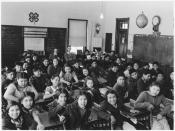Not Good Enough Intentions
The faculty at South Tahoe High School has good intentions for the students they are preparing for graduation. Although they try hard to prepare students for the real world and make them better citizens through the process, it seems as if they have a sort of tunnel vision by expecting the same thing from every student. The faculty cannot relate to the students. Therefore, the list of expectations for the "ideal student" is wrong and unfair. South Tahoe High School does a good job preparing certain students for graduation, however, there is room for improvement in each of the six categories of expectations.
Teachers rarely push their students to memorize vocabulary, use good grammar, or read. Vocabulary is key for students to know in college, for the SATs, and overall understanding of the world, other people, books, and other literature. Students memorize the vocabulary words because they are forced to, not because they want to, and they memorize the words temporarily in order to pass the next quiz.
Students don't care if they know fancy words or have a large vocabulary because teachers don't make them care. It is important for students to know how to put sentences together in the correct form. Otherwise, they will be looked upon by others as unintelligent. Students should also read because they want to, not because they're forced to, which also makes a student smarter and more willing to learn.
Teachers require outside reading, which allows students to choose the book in which they read, but when a teacher forces a book on a student, he resists. Teachers allow the student to make their own choice in which they choose what book they want to read, but still force the idea of reading a book on a student, which...



Article or essay
Seems like an essay, yet it doesn't!
I don't know if you understand what i'm trying to say, but when you start reading it, it sort of gives you the idea of an article, but yet an article is supposed to be divided in multiple short paragraphs. I wonder how come the essay was based on that topic! How come it was such a significan one that made you write a 5 or more prolonged paragraphs on it! Oh well, at least it was worth reading it!
Good job!
0 out of 1 people found this comment useful.